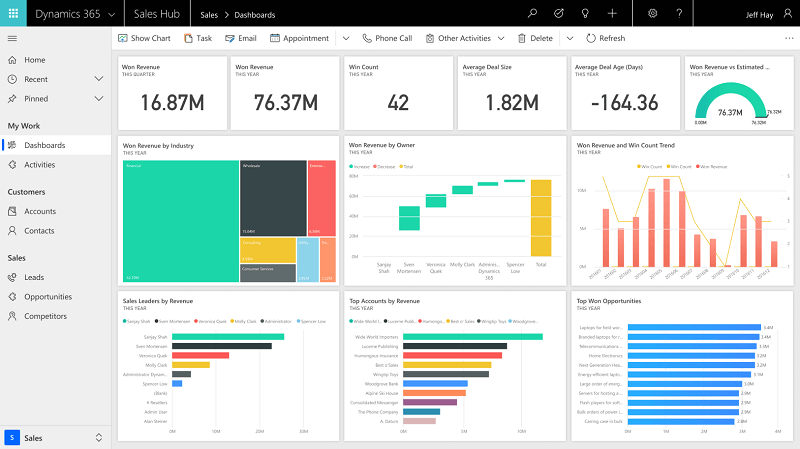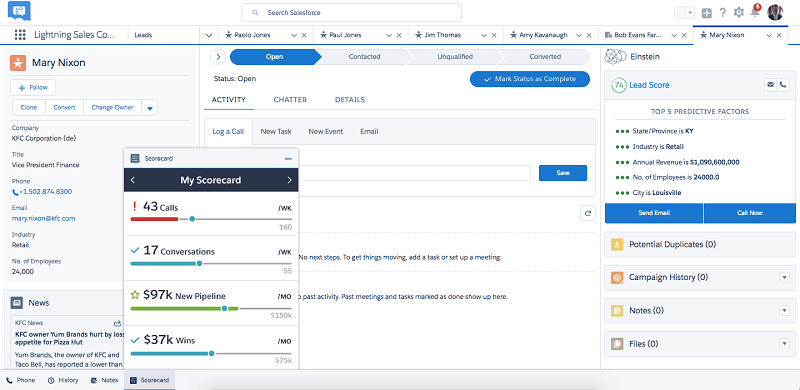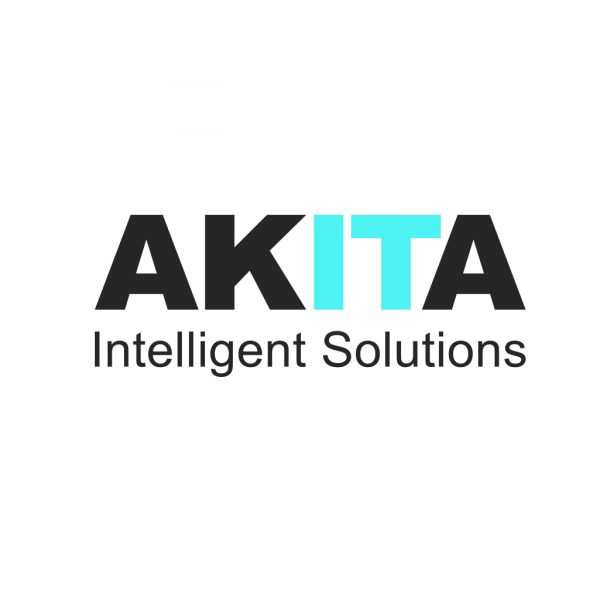Microsoft Dynamics 365 and Salesforce are the two market-leading CRM solutions for modern businesses.
Two of the largest names in this sphere are Microsoft Dynamics 365 and Salesforce, when it is about a Customer Relationship Management (CRM) system. Both provide the sales, marketing and customer service teams with powerful tools but which one is best suited for your organisation? We are going to map out here what exactly makes Microsoft Dynamics 365 different from Salesforce, which will enable you to know where your needs fit best and help make an informed decision.
Sales CRM Systems: What are they and why does your business need one?
It is a must-have tool for managing relationships with current and potential customers. They unify data, automate processes and give you intelligent insights to make actionable business decisions. For small startups to large enterprises, the ideal CRM system can greatly help you in communicating with customers and reporting sales performance — improving your overall productivity.
Dynamics 365 vs Salesforce:
Features Comparison
When it comes to Dynamics vs Salesforce, both cover similar areas of sales, marketing initiatives like digital re-marketing (i.e., targeting people who have seen an ad for a particular product but not otherwise converted on your website or apps, etc.), and customer services. Sales processes are customisable to the way your business operates, this applies to both platforms. However, there are important distinctions in the manner these platforms provide their products. So here is the basic functionality of both CRM solutions.
Customisation and Flexibility
Dynamics 365:
- Built on the Microsoft ecosystem, it offers native integration with other Microsoft apps like Office 365, Teams, and Power BI. It is very customisable and can be tailored to meet the specific demands of unique workflows or processes within an organisation.

Salesforce:
- Famous for its flexibility, Salesforce offers tons of third-party integrations through the AppExchange marketplace. It can be customised to a high degree, but this may also require more technical knowledge if you want things configured in just the right way.

Winner:
Customers already using a Microsoft-based ecosystem or looking for automated personalisations in their CRM system that decrease reliance on human input are best served with Dynamics 365.
Ease of Use
- Dynamics 365: Those already familiar with Microsoft applicationswill feel at home with Dynamics 365. The Office 365 integration makes the application seem unified. If you are not a part of the Microsoft ecosystem, there is a bit of a learning curve, but it remains relatively intuitive.
- Salesforce: The UI for Salesforce is very understandable and allows for drag-and-drop customisation. It provides a cleaner and simpler UI that even beginners can quickly get comfortable with. However, the feature-packed versions (like Salesforce Lightning Unlimited Plan at $50 per user per month) may feel overwhelming for smaller teams.
Winner: Salesforce is sometimes seen as easier to use right out of the gate, especially for businesses that do not have intense integration requirements.
Pricing and Licensing
Dynamics 365: Pricing is more flexible and usually cheaper than Salesforce (for companies already using Microsoft services). Dynamics 365 offers several licensing options for different user roles and levels of access.
- Salesforce: Known for its premium pricing, Salesforce provides various pricing plans based on the features required. However, costs can quickly add up, especially for businesses looking to scale.
Winner: Dynamics 365 is generally a more flexible and affordable option, particularly if you're already using Microsoft services.
Integration Capabilities
- Dynamics 365: Integration is where Dynamics 365 excels. It integrates naturally with all Microsoft services, creating a seamless environment for data transfer between applications such as Outlook, Excel, and SharePoint.
- Salesforce: Salesforce's AppExchange marketplace is a key strength, with thousands of third-party apps to choose from. However, setting up and managing integrations can be more complex.
Winner: Dynamics 365 offers better native integration for businesses already using Microsoft products, while Salesforce supports more third-party integrations.
Automation and AI Features
- Dynamics 365: Dynamics 365 offers a wide range of AI-powered sales features through its Copilot. This includes pipeline prioritisations suggestions, summaries of sales meetings, email sentiment analysis, and recommendations for email replies.
- Salesforce: With Salesforce's Einstein AI, users can automate tasks, predict sales trends, and gain insights into customer behaviour. Einstein AI is considered one of the best AI solutions in the CRM space.
Winner: Dynamics 365 advanced AI functionality is a real game-changer for sales teams.
Community and Customer Support
- Dynamics 365: Microsoft offers 24/7 tech support, a comprehensive knowledge base, and a community forum. However, some users report slow resolution times.
- Salesforce: Salesforce provides strong community support, including customer success managers who proactively ensure users get the most out of the platform.
Winner: Tie - both have active support communities and well-regarded customer support. There are a wide array of Dynamics 365 support services partners out there.
Microsoft Dynamics 365 vs Salesforce: What's The Bottom Line?
The best choice for your business depends on the tools you already use, your budget, and the scale of changes you're willing to implement. Here’s a simple breakdown to help you decide:
| Feature | Dynamics 365 | Salesforce |
| Customisation | Ideal for enterprises using Microsoft products | Great third-party integration choices |
| Ease of Use | Familiar for Microsoft users | User-friendly, great for smaller teams |
| Pricing | Cost-effective, especially for SMBs | More suited for larger enterprises |
| AI Capabilities | Strong AI & automation via Power Platform | Best-in-class AI with Einstein |
| Integration | Seamless integration with Microsoft apps | Vast third-party app marketplace |
| Customer Support | Slower resolution times | Excellent community and customer support |
Dynamics 365 vs Salesforce: Takeaways for Your Business
If your company heavily relies on Microsoft products, Dynamics 365 may be the more economical and seamless choice. However, if you're looking for advanced AI features and a large marketplace of integrations, Salesforce could be the better investment. Both platforms are highly customisable, though Salesforce may come at a higher price.
The decision between Dynamics 365 vs Salesforce depends on your priorities, cost, customisation, AI, and ease of use. Each platform has its strengths, and the right CRM will help you stay competitive and grow your business.
To decide for yourself, view our demo of Dynamics 365 Sales. After that, we can show you the full breadth of Dynamics 365 functionality to see if it’s the right fit for your business.
Discover more about Microsoft Dynamics 365 Sales solutions:





